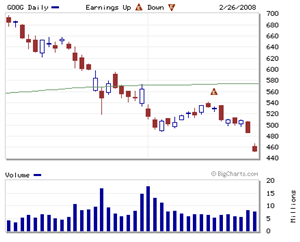Google not so recession proof after all: Monetization down in January

The handwringing over Google's 0.3 percent decline in web search paid clicks in January from a year ago is palpable. Apparently folks are just coming around to the idea that Google may not be completely immune to a slowing economy.
Google shares got whacked on Monday and again Tuesday on worries about comScore's Web search paid click data. In January, Google's search paid clicks were 532 million in January down 0.3 percent from a year ago. In December, Google had 13 percent growth from a year ago.
Meanwhile, January searches for Google's Web sites were up 40 percent from a year ago. Part of this paid click decline in January could be Google's efforts to improve the quality of leads. But few analysts were giving that explanation much play. Mark Mahaney, an analyst at Citigroup, says there could be "a macroeconomic dampening of commercial queries by searchers."

UBS analyst Benjamin Schachter cut his price target for Google to $590 from $650 and noted he's cautious about the company's outlook.
Credit Suisse Cowen & Co. analyst Jim Friedland notes that the January comScore stats "indicates that a slowing economy may be having an impact on Google's growth." Friedland, however, makes an interesting distinction. He maintains that marketers are unlikely to cut by on advertising that delivers results. Following that logic, he argues that Google is seeing a demand shortfall from consumers. The text ads are there, but consumers aren't interested in following through.
"The headwinds from a weak economy may have a greater dampening effect than we initially expected," wrote Friedland in a research note.
Stanford Group analyst Clayton Moran added that the paid search clickthrough rates are down across all search providers. That factoid would indicate that demand is lower due to economic worries.
It's still early to declare anything definitive about Google's monetization rates. Perhaps, these paid clicks are of higher quality. But the signs seem to indicate that Google isn't so immune to the economy after all.
The good news is that if Google truly hits a rough patch we'll get to see how management performs. Thus far Google has been a darling that hasn't reached its awkward adolescent phase. We may be seeing a new phase of development for Google.